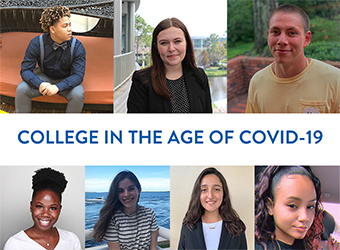- Ally Schneider, Senior, University of North Florida; Student Government President
- Andrea Rivera, Junior, University of Miami
- Scottie Wilks-Alvarado, Sophomore, Valencia College
FCAN host: Kristen Hengtgen, Research Analyst
To cap off our fall series, College in the Age of COVID-19, FCAN hosted a December 17 webinar featuring three college students from across Florida. The student panelists shared details about their unusual and stressful semester, and described how COVID-19 has affected their mental health, online instruction, and career pathways.
COVID-19 has upended all aspects of college life
The student panelists shared their experiences with online and hybrid instruction this fall, including their successes and struggles. Andrea, who is taking hybrid classes at the University of Miami, described what it was like to have some in-person sections with assigned seats, distanced professors, and plexiglass dividers between students. She was “really grateful” she had some in-person options because she appreciates human interaction, but found it was “so easy to disengage and turn off” in her remote classes. Scottie, taking all his classes online at Valencia, enjoyed the responsibility of setting his own schedule, but noted that “not having your teacher in front of you [made it] more difficult to get help.” He missed having an instructor — whom he calls the “backbone of the classroom” — available to answer questions in person.
The students also described financial challenges during COVID-19, and the ways their universities pivoted to support students. Scottie, who works as a financial aid ambassador at Valencia College, shared “we’ve actually found there are a lot more people in need now, a lot more stressed and a lot more worried.” In his job, he helps educate students on financial stability and emergency aid options at Valencia. He offered that people may not realize many students use financial aid “to pay bills or pay rent.”
Similarly, Ally shared her experience supporting UNF’s Emergency Relief Fund through her role as Student Government President. Students could apply for funds and receive help quickly in order to pay for rent and make ends meet. She found “there was so obviously a need among college students and their families,” but she was heartened by support from the campus and beyond: “We got a ton of donations from the UNF community, the Jacksonville community,” and the UNF President.
Students have mixed feelings about being on campus
The student participants preach caution when it comes to bringing students back to campus. Scottie feels there is pressure to get back to school in-person, but would “rather be safe than sorry.” He shared the story of his aunt — hospitalized and in a coma for weeks after a COVID-19 infection — noting that “some people really can’t afford to risk” the safety of their family any further.
Ally described a sense of cognitive dissonance amongst college students. She expressed that many students are thinking, “I wish I could be back on campus, I wish I could be back to normal,” but at the same time, “things are not safe enough to go back to campus.” It’s not as simple as stating that students want to be back on campus, since the students have conflicting feelings themselves.
Andrea emphasized the importance of clear messaging and said that “it takes everyone to combat this virus.” She found that when guidelines were unclear or inconsistent, students took them as suggestions. “They’re college students, they’re still going to go to places and do things that aren’t responsible.” To combat that, Andrea said, “we need to emphasize the impact that our own actions have on everyone else, and that it does take everyone to do it.”
Students offer advice for high school seniors
The webinar wrapped with offerings of advice for current high school seniors who may be entering college in a time of uncertainty. Andrea says “to be flexible, be responsible, and stay determined through it all.” She knows that high school seniors probably missed out on a lot of things, but her school did a good job providing socially-distanced activities, and she reassured students they will have opportunities to make human connections or to find a community in college.
Ally wanted to remind students that “professors are just as desperate for interaction as you are,” so students should schedule office hours and other personal time to enhance their learning. “Even though it’s a lot harder to make friends right now,” students shouldn’t stress if they come out of freshman year without many friends or a strong community – they’ll have opportunities and time to make connections.
Meanwhile, Scottie’s advice is to “calm down… this is where you really figure out who you are as a person.” Noting that he has used the pandemic to reflect on his own desires and consider new career paths, he encourages future students to “have an open mind,” because this is the time where you can “realize what you really want to do.”
Show Notes
To hear more from Florida college students — or to view the webinar and download the presentation — take advantage of these resources:
Recording
Slides
College in the Age of COVID-19 series (Part 1, Part 2)
Be sure to visit our Past Webinars page for access to recordings and downloadable material from FCAN’s previous presentations.

